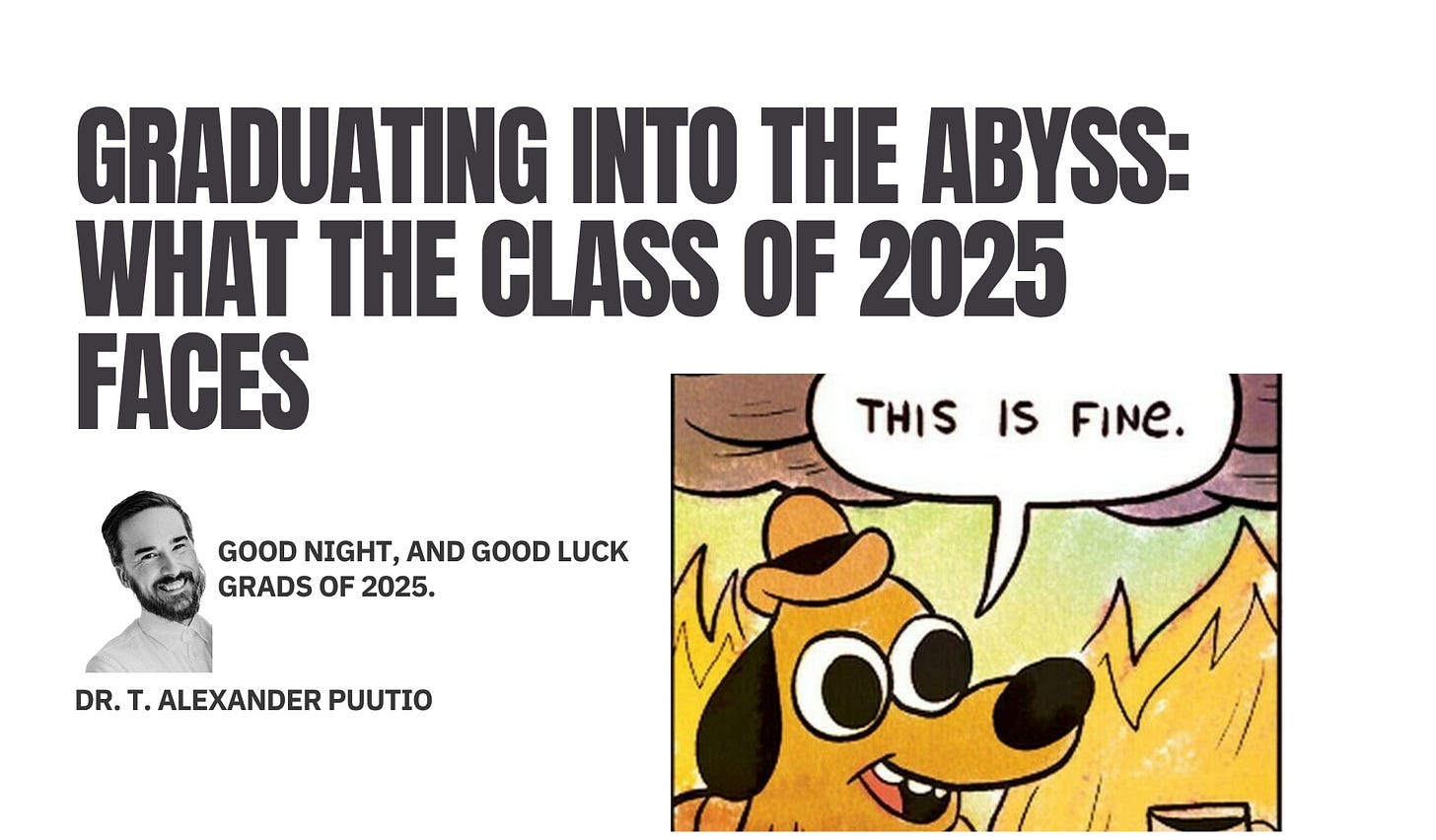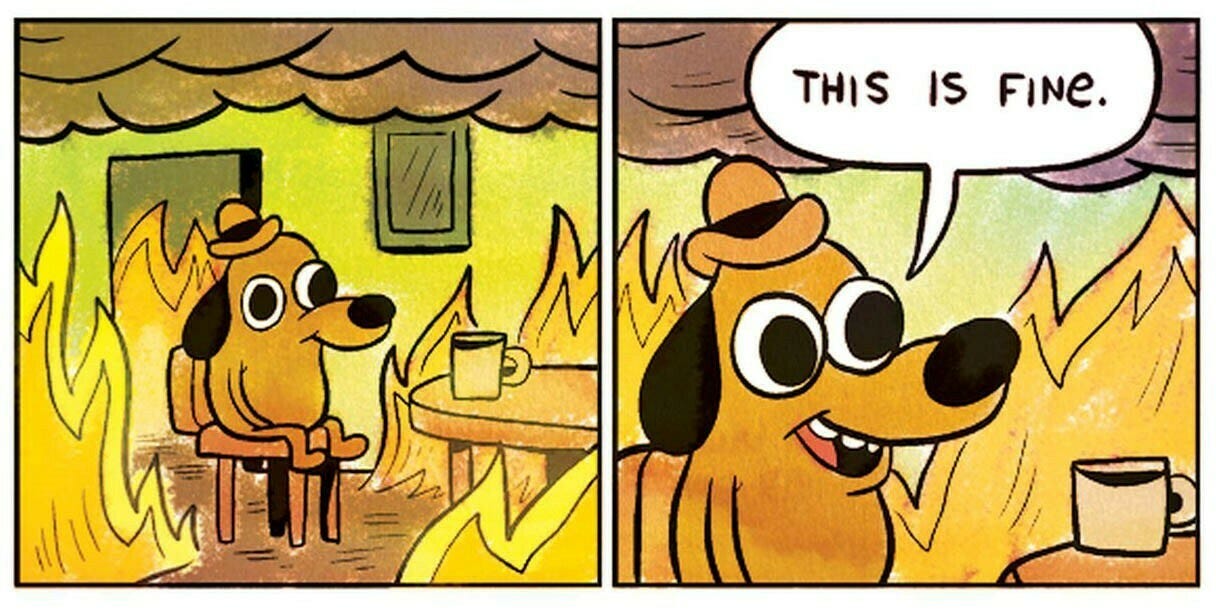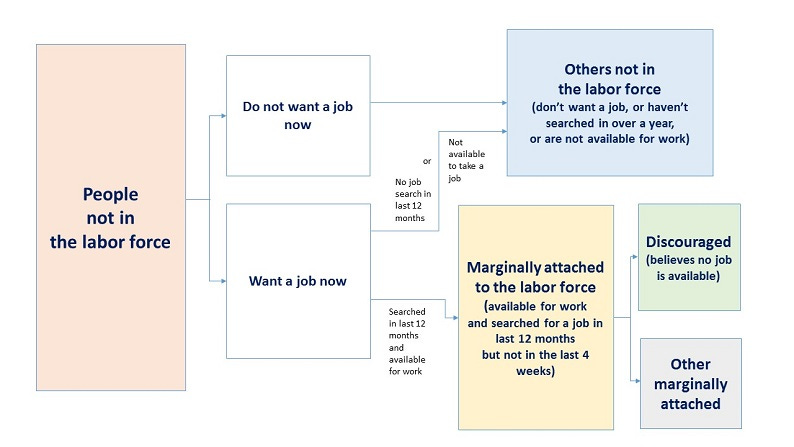In this issue:
What fresh hell is awaiting our intrepid grads of 2025
Why unemployment stats are a con (and how to read between the lines)
Why AI isn't killing jobs as much as it's reshaping what counts as valuable
One honest prayer for new grads, minus the false optimism
June refer-a-thon: A trial pack of Neuro gum up for grabs
Why the weird email timing?
Each issue goes out at when one of my sons were born and made me whole.
This one comes at Matias’o’clock - enjoy!
If there’s ever been a more fitting time for the “this is fine” meme, I must’ve missed it
Graduation season is now well and truly behind us.
The gowns are hung, the group chats renamed, and the young grads me and my colleagues have had the pleasure of corrupting are now officially out there. In the real world, living their lifest lives. Walking headfirst into whatever fresh madness the news cycle has brewed for us this week. And madness, it turns out, is precisely what the 2025 job market seems to have specialized in.
Let’s not sugarcoat it.
The market is rough. In fact, CNN went all out and argued it’s the worst job market for grads in years.
Now before you start the **acherm** acc’hually the job market is doing just fine routine, let me share with you a few curious truths I learnt about reading job market figures during my thankfully brief sting working on trade and labor stats.
Yes, the youth unemployment rates are hovering near long-term lows (below). No, it doesn’t mean the kids are a-ok out there. Quite the opposite (look even further below).
There’s a great con going on with unemployment statistics that most people miss, and it all hinges on how we define being “in the labor force” to begin with.
First, if you’ve got a job that pays peanuts or books you for a whopping two hours a month, congratulations, you now count as employed. Yay. Doesn’t matter if that gig can’t cover your coffee habit, let alone your rent, but hey, FRED’s figures look way better this way (don’t get us started on how they count the GDP and financial services).
And then comes the real kicker: if you’ve stopped looking for a job because the jobs simply don’t exist, or you’re so burnt out after the semester you can’t keep trying to get one, you don’t even count as unemployed anymore. Instead of being unemployed you get yeeted out of the labor force entirely. Statistically disappeared so you don’t defile the official numbers with your inconvenient, unemployable antics. Cue Paris Hilton’s immaculate Stop Being Desperate fashion moment, and click here if you Mandela-effected yourself into thinking it was ‘stop being poor’ instead.
Sometimes stats are nothing but structural gaslighting, and it keeps policymakers patting themselves on the back while whole swaths of the workforce quietly vanish into all too literal nothingness.
So, let’s take the unemployment figures with a grain of salt, and instead listen up to those who are on the front-lines, reporting in with jobs being as rare as a sunny day in London.
This is particularly true in the world of development work which I’ve left myself only to usher in hundreds of grads and execs each year from Columbia and Harvard to take my place. Over past graduations seeing this particular cohort of graduates has stirred a very specific emotional cocktail in me that has equal parts pride and projected hope. Pride in what they’ve built with me over the semesters. And projected hope that they’ll reach the levers I once found rusted shut in service of the Secretary-General, and that they’ll find the strength move them further than I ever could.
That hope now comes tinged with realism, if not full-blown resignation given how one of the most dependable landing zones for purpose-driven graduates is quietly imploding. The U.S. has abruptly withdrawn from several key partnerships and development commitments, leaving even the most promising young talent without a cause to fight for or an organization to house it.
I’ve been working on a series of pieces for Stanford Social Innovation Review alongside colleagues from Harvard, Columbia, Save the Children, and Citi (and, if all goes to schedule, Peter Singer) that will explore this unraveling and I’ll post the series here as it becomes live. I can also offer a sneak peek : I’m morally opposed to the gutting of the field, but I’m not at all surprised by it. I could walk the DOGE team through two dozen cuts that would actually make the UN more agile and fit for purpose without even waking up to do so. It may be difficult to acknowledge, but some of the current attacks on the system are deserved, not least because of how many of us in the liberal elite never bothered to bring the rest of the world along for the journey. We spoke in mission statements and all the rest of the world heard was static.
So, yes, the decimation of the development sector is its own tragedy. But even for grads with no intention of donning a UN badge, the world in 2025 has other plans. And not necessarily good ones.
Thank you, Sam Altman
We’re watching a collision of compounding trends in the job market and our grads have a front-row view.
First is the AI disruption that’s rewriting the rules of white-collar work. At my own post-BCG startup, we now get done with one analyst what used to take ten. That’s great for those with big-boy-hiring-shoes on and its awful for recent grads holding freshly minted diplomas and student debt the size of a down payment looking at one of them doing the job of ten. Thanks to OpenAI’s scientists who never stopped to think whether they should, AI is automating entry-level knowledge work before those entering the workforce even get a shot at trying it.
But here’s where it gets interesting, and, dare I say, hopeful.
After dozens of interviews with AI founders, executives, and product leads at foundational AI companies, I’m increasingly convinced that the upstream downturn in hiring is temporary. Not because the jobs will come back in the same form, but because the terrain itself is shifting in ways that will make better use of our grads soon enough.
Soft skills that were once dismissed as “nice to have” are quickly becoming the only differentiator that machines can’t replicate. Or, to quote Scott Belsky from our recent conversation: “This is the golden age of creativity.”
Think about that for a moment (and email me if you don’t agree even after you have, I might learn something).
If AI levels the playing field on technical ability, what remains is the deeply human: ideas, narrative, improvisation, empathy, presence. Lightning won’t strike what blends in. It will find what stands out.
That’s the threat for our grads, and its also the opportunity.
It also means that we need to unteach much of what we've drilled into students for the past two decades about career paths.
The old model of learning a niche, becoming an expert and extracting predictable returns was built for a slower world where paradigm shifts came on a tidy schedule. A stable world where one seismic shift per generation was just fine, thank you.
In its place we have a kinetic, fluid ecosystem where generalists are no longer dismissed but in demand. Where introverts will have to find their voice, and extroverts will have to sharpen their substance. Where knowing how to sell your idea clearly, ethically, repeatedly matters much more than the credentials behind it.
I tell my students this whenever they are foolish enough to ask for advice: your job isn’t to find the next safe rung on the career ladder. There are none to be had in 2025. Your job is to build scaffolding for a different path altogether. One that is rooted in curiosity and leads to a life that you won’t regret even if AI automates the entire industry faster than you can drop your graduation gown. I encourage them to build a careers that are resistant to premature optimization and ones that are designed for resilience, not résumé points, much like the humble slime mold has figured out to live its life after hundreds of millions of years of evolution.
You need range because this economy, our new reality, doesn’t reward linearity.
Instead, it rewards those who can thrive with ambiguity and create value by connecting disparate fields of work and play. And whether you’re entering public service, launching a startup, or building a life between those poles, you are already standing in the fire. The only decision you have to make is how you move through it.
So yes, the world our graduates face is on fire. But many of them already know that. They were born into smoke.
What they decidedly don’t need is false optimism. They’re not graduating into the world we promised them. But they might just be the ones to build the one we desperately need.
Oh, and if you’re looking to add tomes to your own stack, Robert’s Stoic Capitalist is a great one to place on top. Refer a friend to be eligible for winning a signed copy.
A book to read
This is the book that sparked this entire post.
If you’ve ever wondered how we managed to trick an entire species into working this much, start here.
Suzman’s anthropological unpacking of the modern work ethic is one of the best on-ramps into understanding just how weird, recent, and wildly unsustainable our 9-9-6 relationship with labor really is.
There’s a lot of heat around work right now: hustle culture backlash, quiet quitting, RTO mandates and AI-induced job precarity. This book gives it the historical, evolutionary and behavioral context you need to think clearer.
It won't solve your existential crisis. But it might explain where it came from.
A thing to do
Build laterally, instead of just thinking it
Everyone’s preaching “lateral thinking,” but what we really need is lateral building.
A scaffolding that goes wide, not just tall is the one that withstands the storm. Getting the second degree, picking up Python, reading about quantum mechanics on a weekend is not wasted effort, it’s insulation against the nuclear winter.
Think of it like the slime mold’s backup oats. It doesn’t know which path will be cut off, so it lays them all down. It explores, it experiments and most importantly, it survives.
Your curiosity is a survival mechanism. Feed it accordingly.
A thought to have
A prayer for your recent grad
Don’t sugar-coat it. Don’t send an “it gets better” card. Instead, meet them where the world is meeting them: boldly on fire, decidedly in flux, and frankly more than a bit sassy and unfair.
They’re walking into job markets that ghost them and industries reshaped by tools they didn’t ask for and their professors told them not to use.
So offer them what the world won’t: honesty, encouragement, and actual help.
I’ve been taking on my own grads, through paid consulting, volunteered academic research gigs (thanks for the cuts 47) whatever it takes to give their resume extra padding.
I invite you to do the same. One leg up goes a long way.
A product to love
SeedLegals Raise Platform
Raising capital is another fresh hell I wouldn’t wish on my mortal enemies. Especially if you’re the kind of founder who’s too busy building and exploring the work itself instead of keeping ten pitch decks spinning in the air.
SeedLegals takes that pain and turns it into product. Their raise platform streamlines the chaos, keeps the legalese out of your way, and lets you get back to the part that matters: making something great.
We’re down to the last million in our round, and their advice has saved us days, maybe weeks. Absolutely worth it.
Recent writings on Forbes and beyond
Latest: Declining Birthrates Are Breaking The Economy. Can We Fix It In Time?
In Defense of Intuition: Why Gut Feelings Deserve Respect (Psychology Today)
Your Brain Hates Your Cubicle—Here’s How to Thrive Anyway (Psychology Today)
Arvind Jain: The Humble Builder Behind Glean And The Future Of Agentic AI (Forbes)
The Outsider Advantage: How Naïveté Fuels Billion-Dollar Startups (Forbes)
Never Make a Bad Choice Again by Embracing Self-Nudging (Psychology Today)
The Psychology Of Better Choices: How Startups Are Rewiring Our Habits (Forbes)
Staying Curious Is the Most Dangerous Thing You Can Do (Psychology Today)
After Arkansas: The Future Of FEMA And U.S. Disaster Relief (Forbes)
Ryan Gellert on Building a Future Where Sustainability Is Not Optional (Forbes)
Why Struggling (the Right Way) Helps You Learn (Psychology Today)
Want to Make Better Decisions? Copy the Slime Mold (Psychology Today)
Your Brain Was Built to Forget—Make It Work For You (Psychology Today)
The Case For Terminal Optimism In An Unpredictable World (Forbes)
The AI Coordination Revolution You Haven’t Heard About Yet (Forbes)
Where and how to get involved
A book is coming.
The Curiosity Code (yes, the book) is officially in motion. I’ll be drafting chapters this fall, weaving together insights from CEO interviews, classroom sessions, and conversations like the one we’re having here. If you have stories about range, curiosity, or unorthodox paths — I’d love to hear them in the chat or comments.
A podcast is brewing
We’ve started taping episodes for the first season of The Curiosity Code podcast. Early guests include the CEOs of Lovesac, Grindr, NOVOS, Front, and Aampe, and if the stars align, Ryan Reynolds and Stephen Dubner will make appearances. Can’t wait to launch this properly in a few months.
I am currently conducting a study on range and how it impacts people’s career trajectories. Ten questions and a name will get you on the hall of fame as we pump up the n on the study. Link below - thanks for considering it!
You’ve reached the end - thanks for scrolling all the way down.
Curiosity is best when enjoyed in great company.
Refer this issue and grab a chance to get a tester package of Neuro blessed by the founders themselves (randomly selected from all referrals made). I’m connecting with the duo for a longer chat, recorded for the upcoming Curiosity Code podcast, and will be grilling them on their curios path to setting up the company. If you want your question included in the mix, hit me up via the Substack chat or email.















